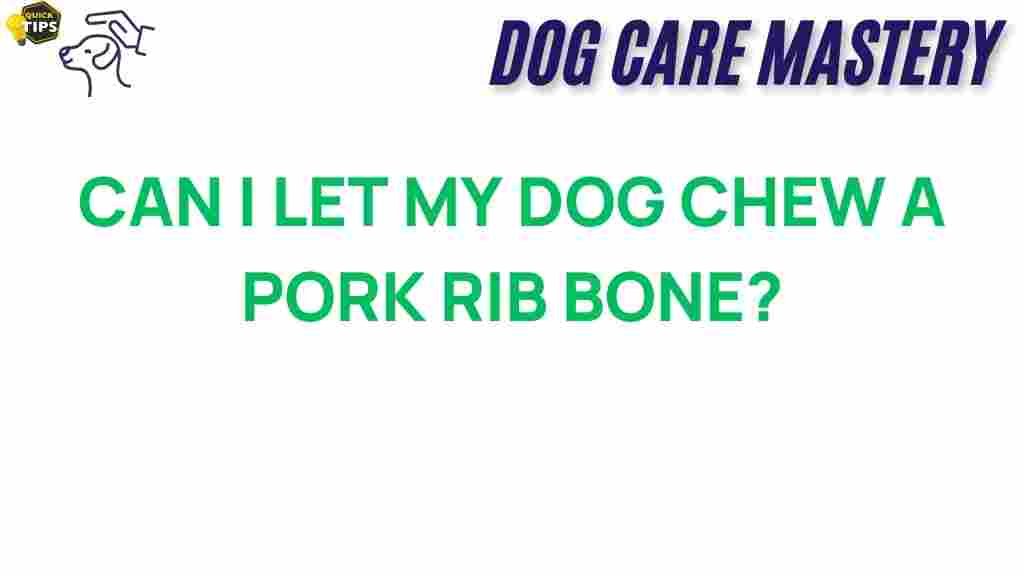The Hidden Dangers of Letting Your Dog Chew Pork Rib Bones: Understanding Dog Health
As a dog owner, you want the best for your furry friend. You may have heard that giving your dog certain types of bones, like pork rib bones, can keep them happy and healthy. However, the truth is far from it. While chewing bones can be a natural activity for dogs, it’s essential to understand the potential risks associated with pork rib bones and how they can impact your dog’s health.
Understanding the Risks
Pork rib bones can pose several hidden dangers that can affect your dog’s health. Here are some of the main concerns:
- Choking Hazard: Dogs can easily choke on small pieces of rib bones, especially if they are not properly supervised during chewing sessions.
- Splintering: Cooked pork rib bones can splinter when chewed, leading to sharp fragments that can cause injury to your dog’s mouth, throat, or digestive tract.
- Obstruction: If a piece of bone gets lodged in your dog’s intestines, it can lead to a life-threatening obstruction that requires emergency surgery.
- Dental Damage: Hard bones can fracture your dog’s teeth, leading to pain and expensive dental procedures.
- Pancreatitis Risk: Pork is high in fat, and consuming fatty meats can trigger pancreatitis, a serious and painful condition.
Why Dogs Enjoy Chewing Bones
Dogs have a natural instinct to chew, which helps keep their teeth clean and provides mental stimulation. Chewing bones can be satisfying for them, making it a popular treat among pet owners. However, choosing the right type of chews is crucial for promoting optimal dog health.
Alternatives to Pork Rib Bones
Instead of pork rib bones, consider these safe and healthy alternatives that can satisfy your dog’s chewing instincts without the associated risks:
- Raw Bones: Uncooked bones, such as beef knuckle or lamb bones, are generally safer as they are less likely to splinter.
- Dental Chews: Commercially available dental chews are designed to promote oral health while being safe for dogs to consume.
- Vegetable Chews: Carrots and sweet potatoes can provide a crunchy texture and are low in calories.
- Toys: Durable rubber toys can withstand chewing and provide mental stimulation.
How to Choose Safe Chew Toys
When selecting chew toys for your dog, consider the following:
- Material: Look for durable materials that won’t break easily, such as rubber or nylon.
- Size: Choose toys that are appropriate for your dog’s size to prevent choking hazards.
- Texture: Pick toys with varying textures to promote dental health and keep your dog engaged.
Identifying Signs of Trouble
If your dog has already chewed on pork rib bones or any other potentially harmful items, it’s crucial to monitor their health closely. Here are some signs of trouble to watch for:
- Vomiting or diarrhea
- Loss of appetite
- Lethargy or excessive tiredness
- Signs of pain, such as whining or difficulty moving
- Excessive drooling or difficulty swallowing
What to Do If Your Dog Shows Symptoms
If you notice any of these symptoms, it’s essential to act quickly. Here’s a step-by-step guide:
- Contact Your Veterinarian: Reach out to your vet immediately for advice and guidance.
- Monitor Your Dog: Keep an eye on their behavior and health to provide your vet with detailed information.
- Prepare for a Visit: If advised, be ready to take your dog to the vet for a thorough examination.
Preventing Risks to Your Dog’s Health
Prevention is always better than cure. Here are some tips to ensure your dog remains healthy:
- Educate Yourself: Research safe chew options and avoid giving your dog harmful items like cooked bones.
- Supervise Chewing: Always keep an eye on your dog when they are chewing to prevent choking or injury.
- Regular Vet Checkups: Schedule routine vet visits to monitor your dog’s overall health.
- Maintain a Balanced Diet: Ensure your dog eats a diet appropriate for their age, size, and activity level.
Internal Resources for Dog Owners
For more information on keeping your dog healthy and safe, check out our article on best practices for dog nutrition.
Conclusion
While it may seem harmless to let your dog chew on pork rib bones, the reality is that it poses significant risks that can jeopardize your dog’s health. Understanding the dangers, choosing safe alternatives, and monitoring your dog’s health are vital steps every pet owner should take. By prioritizing your dog’s health and well-being, you can ensure a long, happy life for your furry friend.
For more safety tips and resources on dog health, don’t hesitate to explore our website and stay informed.
Remember, your dog’s health is priceless, and making informed choices can help keep them safe and sound!
This article is in the category Safety and created by dogcaremastery Team
